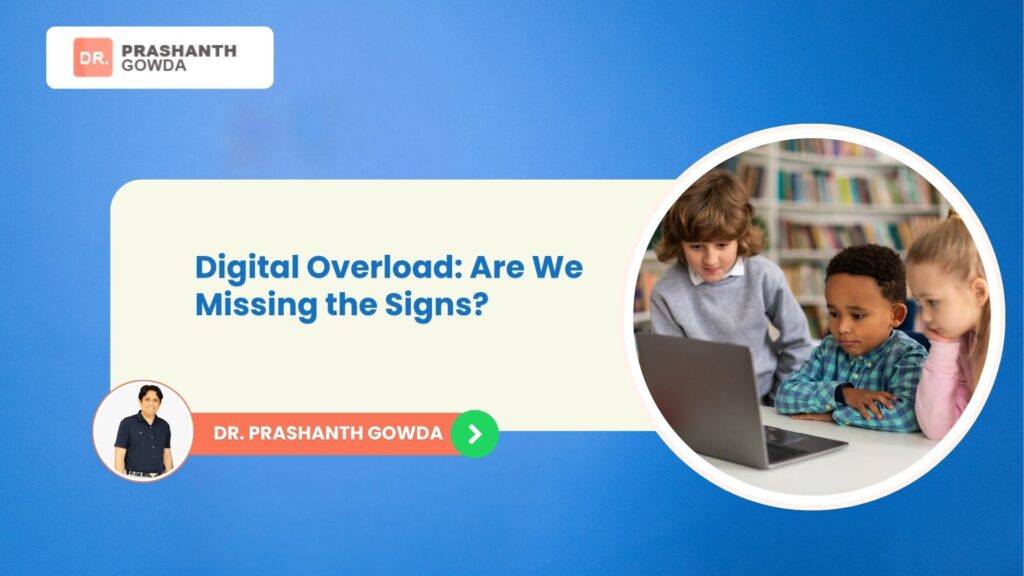Digital Overload: Are We Missing the Signs? | Dr. Prashanth Gowda
In today’s fast-paced digital world, screens have become an inseparable part of our lives — and our children’s too. From online learning to entertainment, kids are spending more hours glued to smartphones, tablets, and TVs than ever before. While technology offers immense benefits, excessive screen time can silently affect a child’s physical, emotional, and social well-being. As Dr. Prashanth Gowda, the Best Pediatrician in HSR Layout, often reminds parents — “Balance is the key. Technology should support growth, not hinder it.”

Understanding Digital Overload
Digital overload refers to the mental and physical strain caused by prolonged exposure to digital devices. For children, whose brains and bodies are still developing, the impact can be profound. It can affect sleep patterns, concentration, eye health, posture, and even emotional regulation. Many parents overlook the subtle signs — thinking their child’s irritability or inattention is just “a phase.” In reality, it could be the early symptom of digital burnout.
Signs Parents Should Watch Out For
- Sleep Disruptions: Blue light from screens interferes with melatonin production, making it harder for kids to fall asleep.
- Behavioral Changes: Increased irritability, mood swings, or lack of interest in physical play.
- Academic Struggles: Difficulty focusing on homework or lessons due to reduced attention span.
- Eye Strain and Headaches: Prolonged screen use can lead to dry eyes and frequent headaches.
- Social Withdrawal: Preference for virtual interactions over real-life friendships.
If you notice any of these symptoms, consulting the Best Child Doctor in HSR Layout, like Dr. Prashanth Gowda, can help identify the root cause and guide you with practical steps to restore balance.
What Parents Can Do
- Set Screen Time Limits: The American Academy of Pediatrics recommends no more than 1 hour of screen time per day for children aged 2–5, and consistent limits for older kids.
- Create Device-Free Zones: Keep mealtime and bedrooms free from gadgets to encourage family bonding and quality rest.
- Encourage Outdoor Play: Physical activities not only improve health but also reduce dependency on digital entertainment.
- Be a Role Model: Kids imitate adults. Limiting your own screen time sets a positive example.
- Seek Professional Guidance: If your child shows emotional or behavioral signs of digital overload, early intervention from a qualified pediatrician is crucial.
Conclusion
Digital devices are here to stay — but their use must be guided wisely. As parents, understanding the balance between technology and real-world experiences can make all the difference in your child’s development. Regular consultations with experts like Dr. Prashanth Gowda, the Best Pediatrician in HSR Layout, ensure that your child grows healthy, active, and emotionally resilient in this digital age.
Frequently Asked Questions (FAQs)
1. How much screen time is healthy for my child?
Children under 5 should have less than one hour of screen time daily, while older children need structured limits based on educational or recreational use.
2. What are the common signs of digital overload in children?
Look for sleep issues, eye strain, irritability, lack of focus, and withdrawal from real-life interactions.
3. Can screen time affect my child’s learning ability?
Yes. Excessive exposure can reduce attention span and impair cognitive development.
4. How can I help my child reduce screen dependency?
Introduce engaging offline activities like sports, art, or reading. Set daily screen limits and encourage outdoor play.
5. When should I consult a pediatrician?
If your child shows continuous behavioral, emotional, or physical changes, consult the Best Child Doctor in HSR Layout, like Dr. Prashanth Gowda, for professional advice.

